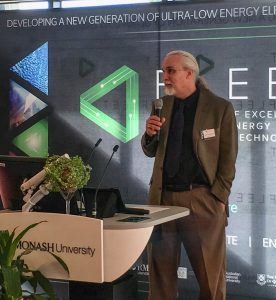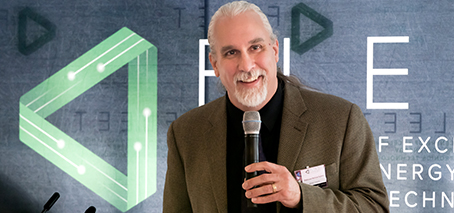
Michael Fuhrer spoke about FLEET’s mission and legacy at the Centre Launch, 12 June. This is his speech.
The challenge of finding a sustainable path to continuing the IT revolution is critical, and time is running out.
I can tell you today with reasonable certainty that Moore’s Law will be declared dead within the seven-year operation of the Centre–perhaps even before our mid-term review! Computer chips will cease to gain in efficiency, and yet our demand for computation will march ever onward.
This does not take anything away from the enormous success of the silicon computer chip industry. Forty years ago, that industry discovered an amazing thing, a roadmap that would guide them into the future, step-by-step. Many of the steps were difficult and required a huge investment in research to overcome, but the path was clear. As long as you accomplish this step, and the next, and the next, computers will get better every year. This roadmap allowed the industry to push chip performance forward incrementally, year-over-year, for an astounding 40 years of improvement, driving the greatest technological revolution in the history of the world.
But that evolutionary path has come to a precipice. Beyond which is a sea of unknown. The industry simply does not know what lies beyond, only that it must be something entirely different. Of course it would be audacious of me to stand here and tell you that our Centre knows what is out there with 100% certainty. We don’t.
What we do know is that a revolutionary change is necessary, and that revolution can only come from a basic-science, back-to-the-laboratory effort.
The Federal Government, and the ARC through the Centre of Excellence program, has had the foresight to take the risk and provide the long-term basic science funding to address a challenge of this magnitude.
Because of this, FLEET is in the lead, ready to sail out into that sea of unknown. We have a skilled team, and we have identified promising new lands, and we are starting to map their shores and discover the rules which will allow us to draw up a new roadmap. In seven years FLEET will have answered the question: Do these new lands and new roads have the ability to take us farther than we are now? We will be able to say whether we have found the roadmap to a better computing technology.
Along the way FLEET will have made many discoveries: we will have invented entirely new materials, new processing techniques, new physical concepts – applicable to broad array of problems, sometimes outside of FLEET’s mission of low-energy electronics. We will work within FLEET and with our partners to exploit these new discoveries technologically.
FLEET will also have trained a new generation of scientists and engineers to work on the next wave of computing technology. And FLEET will have inspired younger students to pursue careers in science and technology, and demonstrated to the public the value of basic science research in addressing societal challenges.
But ultimately the legacy of FLEET will be to expand the boundaries of what is known and hopefully find the roadmap to a sustainable future for computing.
Prof Michael Fuhrer spoke about FLEET’s mission and legacy at the Centre Launch, 12 June. This is his speech.
More information

